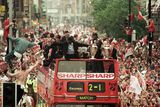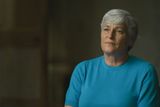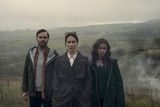Handling piglets while sporting a neon manicure, Jeremy Clarkson's Irish girlfriend Lisa is a credit to her country
The media millionaire and his working-class associate Kaleb embody a countryside class divide in Clarkson’s Farm
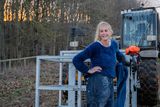
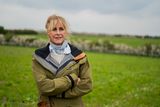
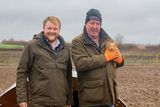
I never knew fertiliser was so expensive. You can spend over £100,000 on it in a year. Who knew?
Then came Clarkson’s Farm (Amazon Prime). With Jeremy Clarkson wearing checked shirts and still saying ‘lavatory’. And with Kaleb Cooper, who has been farming since he was 12. And so it was that farming became a spectator sport.
Here we are on season three. It followed such a blizzard of information that it was hard to tell where it was all coming from. Of course, we have Clarkson himself, with his two newspaper columns and his genius for publicity, always talking about Diddly Squat Farm; although there is in fact nothing diddly squat about it. It is 1,000 acres of Oxfordshire land and its fields are so flat and so enormous that it looks like savannah or maybe the pampas — perhaps both.
Reviewers have the list from the PR companies of the spoilers we’re not allowed to share. We have a press pack containing interviews with Clarkson, with his Irish partner Lisa Hogan, with Kaleb and with his adviser Charlie Ireland, who is cast as the voice of sanity in all this madness.
Lisa drives farm machinery with the best of them and later in the series is shown handling piglets while sporting a neon manicure. She is impossibly glamorous, and also effective. A credit to her country.
Lisa Hogan. Photo: Amazon
We received the first four episodes, which I enjoyed. But I’ll try to stick to the first, which opens in August 2022, amid the driest summer in 87 years. The potatoes are pebbles. The sunflowers haven’t ripened (“For f***’s sake,” says Clarkson). The echiums are not producing oil (“Bloody hell”) and the Diddly Squat Restaurant has been issued with a closure notice that also extends to the lavatories (yes) and the carpark. Then the cows have to go. And wheat prices are falling.
The original plan was that the cows and the chickens would produce enough fertiliser for the farm, reducing the need for expensive artificial fertiliser, the price of which has risen threefold. But the only thing that is working on the farm is the beehives, says Clarkson. “Lots of dead bees in there,” he says, looking into one of them. Victor the Ukrainian beekeeper says it’s like the Donbas.
Diddly Squat has one hedgerow that is half a mile long and 30ft thick, and a lot of woodland. Clarkson decides to unfarm much of his land. Half of his 1,000 acres is not farmed at all. The other half is mainly arable. So he makes Kaleb farm manager. Kaleb is delighted. “You’re fired,” he tells Clarkson.
Clarkson finds out that his local supermarket is selling blackberries at 6p a berry. Soon he is harvesting them with a vacuum cleaner. Bless
The spine of the series is the competition between them. Who can make more money: the deeply conservative and traditional Kaleb who, despite his youth — he was 25 at the time of filming — is a man who just wants to do things the way he has always done them, or the rather wacky Clarkson, who has the money and the intellectual confidence — and also a TV series to fill — to come up with one scheme after another?
For example, Clarkson finds out that his local supermarket is selling blackberries at 6p a berry. Soon he is harvesting them with a vacuum cleaner. Bless.
Research isn’t his strong suit. He jams the big blackberry picker on an unseen wall. But he sometimes makes sense. They shift the cow muck from the previous 11 months. There’s about 200 tons of it, enough to cover 25 acres. So they saved money. But with the cows gone, it’s soon back to the nitrates.
Then Kaleb decides to plant rapeseed, against everyone’s advice, including Charlie’s. The difference between Clarkson and Kaleb is financial. Kaleb, a young father with no money and no land, is scrabbling for survival. Or, to put it in public relations terms, he’s an entrepreneur. He has got a couple of jobs, a contracting business and not enough hours in the day. Always looking for a break.
In yet another interview, Clarkson has called Kaleb the most entrepreneurial person he has ever met: “He makes Margaret Thatcher look like Stalin.”
Kaleb Cooper and Jeremy Clarkson in Clarkson’s Farm. Photo: Ellis O’Brien/Amazon
But the truth is that Kaleb is a member of the rural working class. The land and the houses in his area are bought by millionaire media types and the question is whether Kaleb will ever be able to buy a farm of his own.
One thing he doesn’t like is regenerative farming, brought to Diddly Squat by a member of Groove Armada, another millionaire media type; Kaleb didn’t know who he was either. “Was you in a band?” he asks Andy Cato. Yes, says Andy, how did you know? “You’ve left your tractor running at a pound a litre,” says Kaleb.
It is a killer line, but in fact, the regenerative farming field that Andy sowed looks promising. Even Charlie said so.
The theory is that fields planted with just one crop which has to be sprayed with nitrates and fertiliser and insecticide — both very expensive — don’t make as much sense as ‘companion planting’ wheat with beans, with the beans fixing the nitrogen in the soil naturally.
Put it this way, regenerative farming hasn’t polluted our rivers to the point that the wild Irish salmon is on the verge of extinction. Just saying.
Fun fact: apparently Andy sold the rights to his songs to fund his regenerative farming. And Jeremy and Charlie are swiftly persuaded to go for the project when Andy offers to pay them the premium price for whatever harvest comes out of that field.
And then the pigs arrive. If you have tears, prepare to shed them now. Clarkson has already written about it.
Join the Irish Independent WhatsApp channel
Stay up to date with all the latest news








